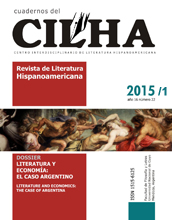Desierto, capitalismo y valores machistas: conjunción de fuerzas feminicidas en "La parte de los crímenes" de 2666
Palabras clave:
Feminicidios, No lugar, Desierto, Misoginia, MachismoResumen
La ubicación geográfico-político–económico- social de Santa Teresa, la ciudad-protagonista de la novela 2666 de Roberto Bolaño, es conspicua; el presente ensayo analiza los feminicidios descritos en "La parte de los crímenes" de esta novela desde la perspectiva de la ubicación espacial que contiene implicaciones claves en las condiciones culturales y los valores éticos de la sociedad descrita. El concepto de no lugar del antropólogo Marc Augé, quien señala que en los espacios de tránsito los valores son fluctuantes; el desierto, tanto de valores, como de emociones y de empatía, la noción desarrollada por el filósofo Gilles Lipovetsky; así como el machismo y la misoginia explicados por la escritora y ensayista chicana Gloria Anzaldúa, contribuyen a entender la existencia de un ambiente especialmente fecundo para el fenómeno de los feminicidios.
Citas
Agamben, Giorgio. "Qué es un campo?", Sibila, n. 1, enero 1995. En línea: http://www.oei.org.ar/edumedia/pdfs/T06_Docu4_Queesuncampo_Agamben.pdf Consultado: 3/12/2014.
Anzaldúa, Gloria. "Borderlands/La Frontera". In: Michael Ryan (coord.). Literary Theory: An Anthology. Julie Rivkin y Malden: Blackwell Publishing, 2004: 1017-1030.
Augé, Marc. Los «no lugares» espacios del anonimato. Barcelona: Editorial Gedisa, 1992.
Bolaño, Roberto. 2666. Barcelona: Anagrama, 2004.
Bolaño, Roberto. Entre paréntesis. Barcelona: Anagrama, 2008.
Diccionario de la Real Academia Española. En línea: www.rae.es Consultado: 3/12/2014.
González Rodríguez, Sergio. Huesos en el desierto. Barcelona: Anagrama, 2002.
Lipovetsky, Gilles. La era del vacío. Barcelona: Anagrama, 2002.
Molina Díaz, Miguel. "Los feminicidios en 2666 de Roberto Bolaño", Contramancha. Revista de arte. En línea: https://contramancha.wordpress.com/2012/11/25/los-feminicidios-en-2666-de-roberto-bolano/ Publicado el 25 de noviembre de 2012. Consultado: 3/12/2014.
Solotorevsky, Myrna. La relación mundo-escritura. Gaithersburg: Ediciones Hispanoamérica, 1993.
Stajnfeld, Sonja. "Cuatro imágenes del mal en 2666 de Roberto Bolaño", Fuentes humanísticas, n. 44, 2012: 69-82.












































